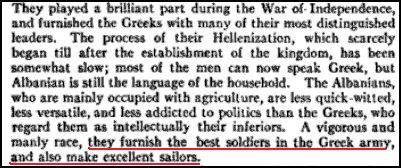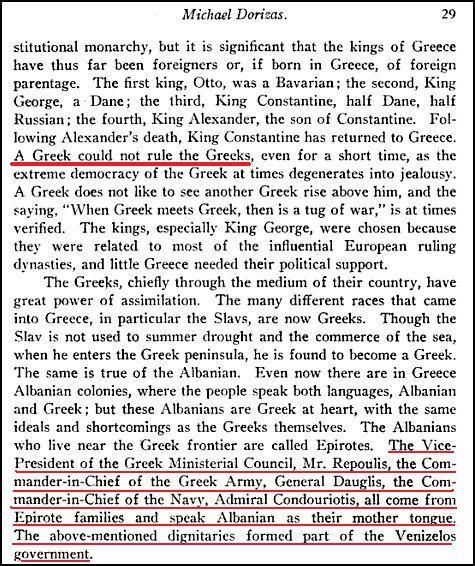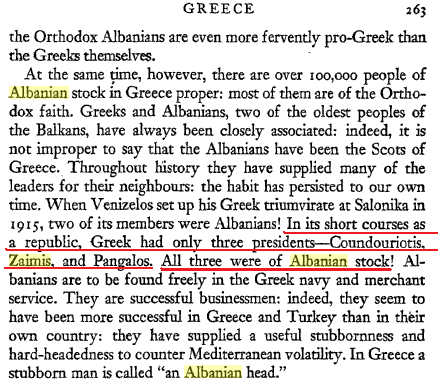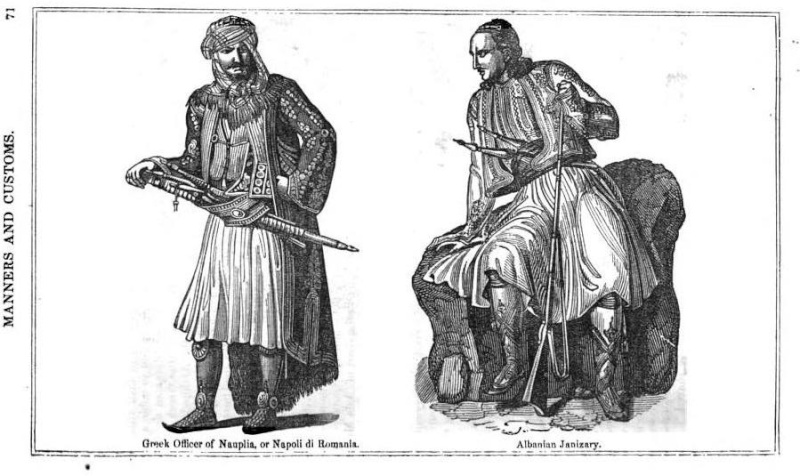We have been accustomed with the groundless claims of our southern neighbors to diminish the influence of Albanians in the creation of Greece. But their madness has no boundary: they are trying with all means to obscure the Albanian origin of the Suliotes. Let take us a look what they have wrote in Wiki:
Marko Boçari was of course a Suliot, but what article fail to mention is that Suliotes were just a branch of Albanian chams, one of the most warlike Albanian communities in south. Their name probably derives from the Albanian word suli, meaning "mountain summit" as Babiniotis ascertained: G. Λεξικό της Νέας Ελληνικής Γλώσσας. Athens, 1998.
Again the Greek editors of Wiki have manipulate the content of article because the Albanian language of Suliotes never became extinct.
Even a modern researcher with Greek sympathies like Katherine Elizabeth Fleming admits kindly that:
Markos Botsaris (Greek: Μάρκος Μπότσαρης, c. 1788 – 21 August 1823) was a Souliote captain[1] and a hero of the War of Greek Independence. Markos Botsaris is among the most revered national heroes in Greece.
Botsaris was born into one of the leading clans of the Souliotes, in Epirus.[2] He was the second son of captain Kitsos Botsaris, who was murdered in Arta in 1809 under the orders of Ali Pasha. The Botsaris clan came from the village of Dragani (today Ambelia), near Paramythia.
http://en.wikipedia.org/wiki/Markos_Botsaris
Botsaris was born into one of the leading clans of the Souliotes, in Epirus.[2] He was the second son of captain Kitsos Botsaris, who was murdered in Arta in 1809 under the orders of Ali Pasha. The Botsaris clan came from the village of Dragani (today Ambelia), near Paramythia.
http://en.wikipedia.org/wiki/Markos_Botsaris
Souliotes (Greek: Σουλιώτες, also spelled Souliots or Suliots) were a warlike community who became famous across Greece for their resistance against the local Ottoman Pashalik of Yanina ruled by the Muslim Albanian Ali Pasha. After their defeat in 1803, the Souliotes were forced to move to the rest of Greece, and many of them played a prominent role in the Greek War of Independence starting in 1821, under leaders such as Markos Botsaris and Kitsos Tzavelas.
The Souliotes originally spoke their own sub-branch of the Cham Albanian dialect and eventually became bilingual in Albanian and Greek. After their assimilation, a language shift to Greek occurred, while the Souliotic dialect became extinct.[1][2]
http://en.wikipedia.org/wiki/Souliotes
The Souliotes originally spoke their own sub-branch of the Cham Albanian dialect and eventually became bilingual in Albanian and Greek. After their assimilation, a language shift to Greek occurred, while the Souliotic dialect became extinct.[1][2]
http://en.wikipedia.org/wiki/Souliotes
Even a modern researcher with Greek sympathies like Katherine Elizabeth Fleming admits kindly that:
“The Soultioes, who are of Albanian origin but usually are grouped separately, also had ancestors who served as exemplars for the community of Souli” (The Muslim Bonaparte: diplomacy and orientalism in Ali Pasha's Greece: 62).
"A Turkish force of four thousand men was surprised one summer night in 1823 by Marco Botsaris, one of the ablest champions of Greek independence, and three hundred and fifty Suliots, a warrior tribe of Albanian descent" (The companion guide to mainland Greece, Brian De Jongh :1983).
In the prerevolution period, Ali Pasha of Joannina in northwest Greece attacked the villages of Souli (1792–1804). Its inhabitants, orthodox Albanians, strongly resisted, and women played an important role.
Women and war: a historical encyclopedia from antiquity to the present: Volume 1 - Page 255: Bernard A. Cook - 2006
Women and war: a historical encyclopedia from antiquity to the present: Volume 1 - Page 255: Bernard A. Cook - 2006














Comment